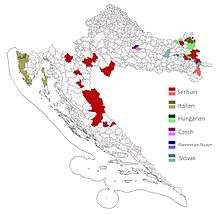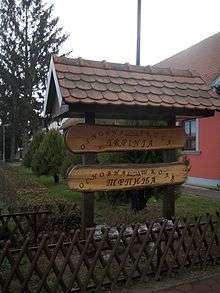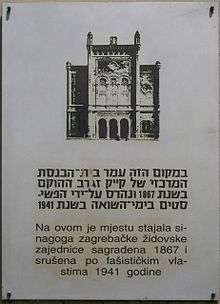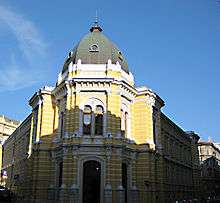Minority languages of Croatia
| Languages of Croatia | |
|---|---|
 Map of municipalities with official minority languages | |
| Minority languages | |
Constitution of Croatia in its preamble defines Croatia as nation state of ethnic Croats, country of traditionally present communities that constitution recognize as national minorities and country of all its citizens. National minorities explicitly enumerated and recognized in Constitution are Serbs, Czechs, Slovaks, Italians, Hungarians, Jews , Germans, Austrians, Ukrainians, Rusyns, Bosniaks, Slovenes, Montenegrins, Macedonians, Russians, Bulgarians, Poles, Romani, Romanians, Turks, Vlachs and Albanians. Article 12 of the constitution states that official language in Croatia is Croatian language, but also states that in some local governments another language and Cyrillic or some other script can be introduced in official use.
The official use of minority languages is defined by relevant national legislation and international conventions and agreements which Croatia signed. The most important national laws are Constitutional Act on the Rights of National Minorities, Law on Use of Languages and Scripts of National Minorities and The Law on Education in language and script of national minorities. Relevant international agreements are European Charter for Regional or Minority Languages and Framework Convention for the Protection of National Minorities. Certain rights were achieved through bilateral agreements and international agreements such as Treaty of Osimo and Erdut Agreement.
The required 33.3% of minority population in cetrain local government unit for obligatory introduction of official use of minority languages is considered high taking into account that The Advisory Committee on the Framework Convention for the Protection of National Minorities of Council of Europe consider threshold from 10% to 20% reasonable.[1] Croatia do not always show favorable views on issue of minority rights but Croatian European Union accession process positively influenced public usage of minority languages.[2]
Affected languages
Serbian

Education in Serbian language is primarily offered in the area of former Eastern Slavonia, Baranja and Western Syrmia based on Erdut Agreement. With those school since 2005 there is also Kantakuzina Katarina Branković Serbian Orthodox Secondary School in Zagreb.
Serb National Council publish weekly magazine Novosti since December 1999. There are also monthly magazines Identitet, published by Serb Democratic Forum, Izvor, published by Joint Council of Municipalities, youth magazine Bijela Pčela and culture magazine Prosvjeta, both published by Prosvjeta and Forum buplished by Serb National Council from Vukovar. There are also three local radio stations in Serbian language in eastern Slavonia such as Radio Borovo.
Controversies
In the first years after introduction of new Constitutional Act on the Rights of National Minorities some local governments resisted implementation of its legal obligations. In 2005 Ombudsman report, municipalities of Vojnić, Krnjak, Gvozd, Donji Kukuruzari, Dvor and Korenica were mentioned as those that do not allow the official use of the Serbian language, although the national minority in these places meets the threshold provided for in the Constitutional Act.[3] The report pointed out that Serbian minority in Vukovar can not use Serbian language although minority constituted less than one percent less population than it was prescribed by law.[3] After 2011 Croatian census Serbs of Vukovar meet the required proportion of population for co-official introduction of Serbian language but it led to Anti-Cyrillic protests in Croatia. In April 2015 United Nations Human Rights Committee urged Croatia to ensure the right of minorities to use their language and alphabet.[4] Committee report stated that particularly concerns the use of Serbian Cyrillic in the town of Vukovar and municipalities concerned.[4]
Italian
Italian minority has realized much greater rights on bilingualism than other minority communities in Croatia.[3] La Voce del Popolo is an Italian language daily newspaper published by EDIT (EDizioni ITaliane) in the city of Rijeka.
Hungarian
In 2004 Hungarian minority asked for introduction of Hungarian language in town of Beli Manastir as an official language, referring to the rights acquired prior to 1991.[3] Hungarian minority at that time constituted 8,5% of town population.[3]
Czech
6,287 declared Czechs live in Bjelovar-Bilogora County.[5] 70% of them stated that their native language is Czech.[5] Ambassador of Czech Republic in Croatia stated that intention to limit usage of Serbian Cyrillic would negatively affect Czechs and other minorities in Croatia.[6]
Slovak
Union of Slovaks in cooperation with the Slovak Cultural Center in Našice publish magazine Prameň in Slovak language.[7]
Yiddish and Hebrew

Organisation Zagreb Yiddish Circle is club that organizes courses in Yiddish language, lectures on Jewish history, linguistics and culture, movie nights, and hosts a Yiddish book club.[8]
Ukrainian
Ukrainian language classes are four schools in Lipovljani, Petrovci, Kaniža and Šumeće, attended by about 50 students.[9]
Romani
Croatian Parliament formally recognised Romani Language Day on May 25, 2012.[10] Veljko Kajtazi, Romani community MP, stated that he will advocate to have the Roma language included on the list of minority languages in Croatia during his term in office.[10]
Municipalities with minority languages in official use[11]
| Municipality | Name in minority language | Language | Affected settlements | Introduced based on | Population (2011) | Percentage of affected minority (2011) |
County |
|---|---|---|---|---|---|---|---|
| Končanica | Končenice | Czech | All settlements | Constitutional Act | 2,360 | 47,03% | Bjelovar-Bilogora |
| Daruvar | Daruvar | Czech | Ljudevit Selo, Daruvar, Donji Daruvar, Gornji Daruvar and Doljani | Town Statute | 11,633 | 21.36% | Bjelovar-Bilogora |
| Kneževi Vinogradi | Herczegszöllös | Hungarian | Kneževi Vinogradi, Karanac, Zmajevac, Suza, Kamenac, Kotlina[12] | Constitutional Act | 4,614 | 38,66% | Osijek-Baranja |
| Bilje | Bellye | Hungarian | All settlements | Municipality Statute | 5,642 | 29.62% | Osijek-Baranja |
| Ernestinovo | Ernestinovo | Hungarian | Laslovo | Municipality Statute | 2.225 (2001) | 22% (2001) | Osijek-Baranja |
| Petlovac | Baranyaszentistván | Hungarian | Novi Bezdan | Municipality Statute | 2,405 | 13.72% | Osijek-Baranja |
| Tompojevci | Tompojevci | Hungarian | Čakovci | Municipality Statute | 1,561 | 9.01% | Vukovar-Srijem |
| Tordinci | Tardhoz | Hungarian | Korođ | Municipality Statute | 2,251 (2001) | 18% (2001) | Vukovar-Srijem |
| Punitovci | Punitovci | Slovak | All settlements | Constitutional Act | 1.850 (2001) | 36,94% | Osijek-Baranja |
| Našice | Slovak | Jelisavac | Town Statute | 16,224 | 5.57% (2001) | Osijek-Baranja | |
| Vrbovsko | Врбовско | Serbian | All settlements | Constitutional Act | 5,076 | 35,22% | Primorje-Gorski Kotar |
| Vukovar | Вуковар | Serbian | All settlements | Constitutional Act | 27,683 | 34,87% | Vukovar-Srijem |
| Biskupija | Бискупија | Serbian | All settlements | Constitutional Act | 1,699 (2001) | 85,46% | Šibenik-Knin |
| Borovo | Борово | Serbian | All settlements | Constitutional Act | 5,056 | 89,73% | Vukovar-Srijem |
| Civljane | Цивљане | Serbian | All settlements | Constitutional Act | 239 | 78,66% | Šibenik-Knin |
| Donji Kukuruzari | Доњи Кукурузари | Serbian | All settlements | Constitutional Act | 1,634 | 34,82% | Sisak-Moslavina |
| Dvor | Двор | Serbian | All settlements | Constitutional Act | 6,233 | 71,90% | Sisak-Moslavina |
| Erdut | Ердут | Serbian | All settlements | Constitutional Act | 7,308 | 54,56% | Osijek-Baranja |
| Ervenik | Ервеник | Serbian | All settlements | Constitutional Act | 1 105 | 97,19% | Šibenik-Knin |
| Gračac | Грачац | Serbian | All settlements | Constitutional Act | 4,690 | 45,16% | Zadar |
| Gvozd | Гвозд or Вргинмост | Serbian | All settlements | Constitutional Act | 2,970 | 66,53% | Sisak-Moslavina |
| Jagodnjak | Јагодњак | Serbian | All settlements | Constitutional Act | 2,040 | 65,89% | Osijek-Baranja |
| Kistanje | Кистање | Serbian | All settlements | Constitutional Act | 3,481 | 62,22% | Šibenik-Knin |
| Krnjak | Крњак | Serbian | All settlements | Constitutional Act | 1,985 | 68,61% | Karlovac |
| Markušica | Маркушица | Serbian | All settlements | Constitutional Act | 2.576 | 90,10% | Vukovar-Srijem |
| Negoslavci | Негославци | Serbian | All settlements | Constitutional Act | 1.463 | 96,86% | Vukovar-Srijem |
| Plaški | Плашки | Serbian | All settlements | Constitutional Act | 2,292 (2001) | 45,55% | Karlovac |
| Šodolovci | Шодоловци | Serbian | All settlements | Constitutional Act | 1,653 | 82,58% | Osijek-Baranja |
| Trpinja | Трпиња | Serbian | Village Ćelije excluded in municipality Statute[13] | Constitutional Act | 5,572 | 89,75% | Vukovar-Srijem |
| Udbina | Удбина | Serbian | All settlements | Constitutional Act | 1,874 | 51,12% | Lika-Senj |
| Vojnić | Војнић | Serbian | All settlements | Constitutional Act | 4,764 | 44,71% | Karlovac |
| Vrhovine | Врховине | Serbian | All settlements | Constitutional Act | 1,381 | 80,23% | Lika-Senj |
| Donji Lapac | Доњи Лапац | Serbian | All settlements | Constitutional Act | 2,113 | 80,64% | Lika-Senj |
| Kneževi Vinogradi | Кнежеви Виногради | Serbian | Kneževi Vinogradi and Karanac[12] | Municipality Statute | 4,614 | 18.43% | Osijek-Baranja |
| Nijemci | Нијемци | Serbian | Banovci and Vinkovački Banovci | Municipality Statute | 4,705 | 10,95% | Vukovar-Srijem |
| Grožnjan | Grisignana | Italian | All settlements | Constitutional Act | 785 (2001) | 39,40% | Istria |
| Brtonigla | Verteneglio | Italian | All settlements | Constitutional Act (2001) | 1,873 (2001) | 37.37% (2001) | Istria |
| Buje | Buie | Italian | All settlements | Town Statute | 5,127 | Istria | |
| Cres | Cherso | Italian | All settlements | Town Statute | 2,959 (2001) | Primorje-Gorski Kotar | |
| Novigrad | Cittanova | Italian | All settlements | Town Statute | 4,345 | 10.20% | Istria |
| Poreč | Parenzo | Italian | All settlements | Town Statute | 16,696 | 3.2% | Istria |
| Pula | Pola | Italian | All settlements | City Statute | 57,460 | 4.43% | Istria |
| Rijeka | Fiume | Italian | All settlements | City Statute | 128,624 | 1.90%% | Primorje-Gorski Kotar |
| Rovinj | Rovigno | Italian | All settlements | Town Statute | 14,294 | 11,5% (2001) | Istria |
| Umag | Umago | Italian | All settlements | Town Statute | 13,467 (2001) | 18.3% (2001) | Istria |
| Vodnjan | Dignano | Italian | All settlements | Town Statute | 6,119 | 16.62% | Istria |
| Bale | Valle d'Istria | Italian | All settlements | Municipality Statute | 1,127 | 36,61% (1991) | Istria |
| Fažana | Fasana | Italian | All settlements | Municipality Statute | 3.635 | 4,82% (1991) | Istria |
| Funtana | Fontane | Italian | All settlements | Municipality Statute | 831 (2001) | 3,12% (1991) | Istria |
| Kaštelir-Labinci | Castellier-Santa Domenica | Italian | All settlements | Municipality Statute | 1,334 (2001) | Istria | |
| Ližnjan | Lisignano | Italian | Šišan | Municipality Statute | 3.965 | Istria | |
| Motovun | Montona | Italian | All settlements | Municipality Statute | 983 (2001) | 9,87% (2001) | Istria |
| Oprtalj | Portole | Italian | All settlements | Municipality Statute | 850 | Istria | |
| Tar-Vabriga | Torre-Abrega | Italian | All settlements | Municipality Statute | 1,506 (2001) | Istria | |
| Višnjan | Visignano | Italian | Višnjan, Markovac, Deklevi, Benčani, Štuti, Bucalovići, Legovići, Strpačići, Barat and Farini | Municipality Statute | 2,187 (2001) | 9.1% (2001) | Istria |
| Vrsar | Orsera | Italian | All settlements | Municipality Statute | 2,703 (2001) | 5,66% (1991) | Istria |
| Bogdanovci | Богдановци | Pannonian Rusyn | Petrovci | Municipality Statute | 1,960 | 22.65% | Vukovar-Srijem |
| Tompojevci | Томпојевци | Pannonian Rusyn | Mikluševci | Municipality Statute | 1,561 | 17.38% | Vukovar-Srijem |
History
European Charter for Regional or Minority Languages became a legally binding for Croatia in 1997.[14]
See also
- Minority language
- Languages of Croatia
- Official language
- Demographics of Croatia
- Linguistic rights
- Language policy
- Languages of the European Union
References
- ↑ "Minorities in Croatia Report, page 24" (PDF). Minority Rights Group International. Retrieved 19 June 2015.
- ↑ "Language Policy in Istria, Croatia–Legislation Regarding Minority Language Use, page 61" (PDF). Acta Universitatis Sapientiae, European and Regional Studies, 3 (2013) 47-64. Retrieved 19 June 2015.
- 1 2 3 4 5 "The Position of National Minorities in the Republic of Croatia–Legislation and Practice, page 18" (PDF). ombudsman.hr. Retrieved 19 June 2015.
- 1 2 "UN calls on Croatia to ensure use of Serbian Cyrillic". B92.net. 3 April 2015. Retrieved 19 June 2015.
- 1 2 "DAN MATERINJEG JEZIKA". Bjelovar-Bilogora County. 22 February 2015. Retrieved 19 June 2015.
- ↑ "Košatka: Reći 'ne može' ćirilici znači biti i protiv Čeha". Večernji list. 18 December 2013. Retrieved 19 June 2015.
- ↑ "Prameň-KULTÚRNO-SPOLOČENSKÝ ČASOPIS SLOVÁKOV V CHORVÁTSKU". Union of Slovaks. Retrieved 21 June 2015.
- ↑ "zagreber yidish-krayz (Zagreb Yiddish Circle)-About". Zagreb Yiddish Circle. Retrieved 27 June 2015.
- ↑ "Ukrajinci u Republici Hrvatskoj". Embassy of Ukraine in Zagreb. Retrieved 27 June 2015.
- 1 2 "World Roma Language Day marked in Croatian Parliament". Croatian Parliament. 5 November 2014. Retrieved 19 June 2015.
- ↑ Government of Croatia (October 2013). "Peto izvješće Republike Hrvatske o primjeni Europske povelje o regionalnim ili manjinskim jezicima" (PDF) (in Croatian). Council of Europe. p. 34-36. Retrieved 2 December 2016.
- 1 2 "Statut Općine Kneževi Vinogradi , article 15" (PDF). Retrieved 7 August 2015.
- ↑ "Statut Općine Trpinja" (PDF). Retrieved 23 June 2015.
- ↑ "Europe and Croatia are living and protecting multilingualism". GONG (organization). 10 December 2013. Retrieved 19 June 2015.
